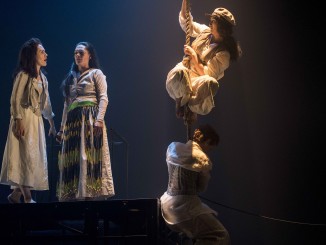
[Nowhere to Run]
We meet a few different versions of Victoria Abbott during Run Rabbit. These vary from, but are not limited to, “Victoria Abbott: normal human woman”, “Victoria Abbott: the actor”, and, of course, “The Rabbit.” Abbott opens the show by acknowledging and grounding her audience in the space, clearly demonstrating our autonomy within it, and showcasing the meta-elements that will be utilised for the hour ahead. Abbott explains that she, Victoria Abbott (normal human woman), only wants us, the audience, to feel safe and demonstrates actions we should take should we not want to listen or see the content at any point. In a theatre culture where trigger warnings are still debated and often taken far too lightly, and trauma is often exploited for entertainment over catharsis, it’s refreshing to see a performer hold her audience with such care before delving into the emotional journey.
The narrative through-line is that of Victoria Abbott’s long-lost ancestor: Black Agnes. We learn that Agnes is fiercely loyal and fiercely Scottish woman from 1338 who finds herself in charge of a castle during a siege against twenty thousand fuck boys, also known as Englishmen. Through Agnes, Abbott demonstrates her strength as a character actor and utilises her audience to help push the story along. The audience interaction is tricky, demonstrated by the reluctance of some audience members to join in, which makes the show drag. However, Abbott’s energy never wavers, and she turns each hinderance into a comic moment.
Abbott uses physicality, word-play and multimedia as access points for us to understand what it’s like for Abbott to navigate a world of violence. The show doesn’t seek to speak for all women, but instead offers a glimpse into Abbott’s gritty reality and wry consciousness. Abbott navigates these elements of the show impressively and director Kate McGill lays out these complex devices with clarity and logic. Instead of muddying or confusing the narrative, as often meta-theatricality can, it only aids the transparency between the multiple narratives that weave through the fabric of this performance. There is nothing about this show that is meta for the sake of being meta, every decision cleanly feeds back to serve the intention of the work: to demonstrate that violence against women doesn’t just happen out of nowhere, it stems from a culture of violence and a culture of invasion.
The crux of Run Rabbit is not for the faint hearted. The play is confronting and the weight of it sits heavy in the air as Abbott hurtles full speed, with the momentum of her ancestry, her experiences, and her pain channeling through her, towards the brutal reality she has carefully unpacked for us. That just like Agnes, women are, by definition, in a state of siege.
It’s difficult to truly convey the sense of deep satisfaction when Abbott’s work comes together to make its point – when the ever-shifting energies that lead up to this moment all align and suddenly the issue is exposed without apology.
“1 in 3 women.
1 in 6 men.
And countless others who fall through the cracks between those two terms.”
Whilst the show covers some of the extreme end of violence and abuse, it also highlights the casual violence that feeds directly into the killing of women and children. From cat calling, performed devastatingly well by Abbott with juxtaposed meanings, to the ingrained dismissive attitudes towards women who come forward and speak out about violence and abuse, as demonstrated through her own experiences.
In the past few months, New Zealand seemingly has had a wake-up call around violence with the death of Grace Millane. With the whole world watching we collectively mourned for this young traveller and griped over the shock of such violence. And yet, we let ourselves down. Grace Millane wasn’t the only woman to die that year: thirteen women were murdered in 2018. Now, as much as ever, we need shows like this to reach out and tell those who are complacent that we are still living in fear. With this in mind, touring a show like Run Rabbit could be an effective way to take this message to the corners of a nation struggling with a toxic culture of violence.
On this note, it feels important to highlight that this show resonates with my own personal experiences, frustrations and anger. It feels important because I know not everyone will feel the same sense of connection to the content watching this show as I did, however, despite this, I am confident that this show can successfully break down the steady spiral into the depths of rape culture for nearly everyone.
There are two strong elements at play that make Run Rabbit such a brilliant piece of work: its careful construction and its vital timing. Jumping off the back of a year of #MeToo and #TimesUp and feeding off the anger and shame we collectively felt as a nation just three months ago, Run Rabbit continues the battle cry of women for justice and allyship. Abbott delivers the show with the passion of millions of women who are sick and tired of asking for your help, so she does not ask, she simply says, “It’s not good enough.”
It’s almost a lecture, but not quite. Victoria Abbott is too charming to lecture. She holds her audience accountable whilst simultaneously entertaining and devastating them. Run Rabbit is a sophisticated piece of theatre that conveys anger with understanding, it educates with patience, and ultimately, Run Rabbit burns with the need for change.
Run Rabbit played Q Vault 28 Feb – 2nd March 2019.
SEE ALSO: Nathan Joe’s review of Run Rabbit’s 2018 debut Basement Theatre season.




Leave a Reply